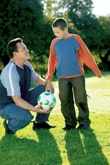|
 |
Make mealtime less of a hassle

While it can be hard to get healthy food on the table, many parents know that the real challenge is getting their kids to eat that healthy food.
Common behavior includes:
- Food jags: will only eat one food meal after meal.
- Food strikes: refuses to eat what is served.
- Food fear: refuses to try new foods.
- Complains about the food you’re serving.
- Wants to watch TV during mealtime.
Kids and organized sports

Millions of children play organized sports each year. The benefits are numerous and include fitness, friendships, commitment, teambuilding skills, and of course, fun. However, there are some potential problems as well: injuries, stress, and pressure, to name a few. When your child is ready for organized sports:
Start by thinking through the goals of having your child play. Is having fun the first thing that comes to mind? It should be. Children love sports because they are fun. Too often, this basic concept gets lost in the pressure to win or excel. While competing is part of athletics, and can provide much of the fun, sometimes the drive to win or excel can dampen the spirit of fun. There needs to be a balance.
After a game or practice, talk to your child about what he enjoyed and what he learned. Whether his team won or lost, or how well the team did (goals, runs, or baskets) is secondary. Emphasize the fun.
Think of sports as a way to start him on a life of physical fitness. Do you expect your child to become an Olympic athlete? In most cases, that would be unrealistic. But you do want him to become a healthy, physically active adult. Introducing him to the joys of physical fitness and the fun of competition at a young age can help him develop into a lifelong athlete.
Let your child participate in sports he wants to play. Let him chase his interests and encourage him to try lots of activities. Even if it becomes clear that your child is especially gifted at one sport, it is not good for him to concentrate year-round on a single activity. Having him play different sports in different seasons accomplishes these goals:
-
He will learn different skills (kicking and running in soccer, hand-eye coordination in baseball or softball).
-
Mixing up sports prevents injuries and burnout; too many young athletes develop overuse injuries and stress fractures from specializing in a sport or position too early for their growing bodies.
Once your child is in sports:
-
Be a good role model; let him see you exercising. Stay in shape and enjoy physical activities with your child.
-
Consider coaching his team, or at least volunteering to help at practices.
-
Go to his games and cheer, but do not criticize or coach. Follow the model set by good youth sports organizations and coaches: They Play. We Coach. You Cheer.
-
Balance the interests of your family as a whole with the demands of your child’s teams. Protect family dinners by eating together before or after practices, even if this is not your family’s regular mealtime. You can also ask the coach not to hold practice during dinner hours.
The statistics on physical activity in American children are not encouraging. Of the 20 to 30 million children who participate in youth sports programs, approximately 80 percent drop out by the age of 12. Only 3 percent of the population plays college sports of any type. Your positive parenting and supporting your child in sports will help him succeed. Let the games begin!
For more on sport safety, read Safety in Team Sports in Healthy Kids newsletter, Volume 7, Issue 3.
Traveling with your child

Traveling with children can be incredibly fun and incredibly hard work. Your child is finally getting somewhat self-sufficient. She walks, eats, sleeps, and plays all on her own. It is time for you to have some adventures! To travel successfully, try these tips:
Plan, plan, and plan some more. The more time you spend thinking through your trip and anticipating your child’s needs, the easier it will be.
- Make packing lists for each stage of your journey: If you are taking a long car trip to go camping, your list might include snacks, water, books on tape or movies, a book of songs to sing in the car and around the campfire or a book of travel games.
- List all of the clothing you will need: daytime, nighttime, cold, hot, and wet weather.
- Cross off the items as you pack them.
Give your child some responsibility. Help her write her own packing list of what she will need (books, crayons, snacks). Let her do her own packing and carry her own backpack on the plane or in the car.
Do not be surprised by the occasional meltdown. One way to prevent meltdowns is to stick to your usual routine as much as possible. Vacations are for loosening up and relaxing, but with kids, getting too loose leads to trouble. Have fun but:
- Try to stick with her usual sleep routines.
- Plan for quiet-time and breaks in your day.
- Do not stray far from her normal nutritious meals and snacks (A few treats are fine, but limit them.)
- Fill a backpack with water, apple slices, nuts, cheese sticks, and carrots to keep your child full and happy.
Enjoy your adventure at your child’s pace. Going too far, too fast, and doing too much will only lead to an exhausted cranky child. Better to have fun doing less.
Set clear expectations. Before you go, talk through what will happen. For example explain:
- Tomorrow we will get up very early and drive an hour to the airport.
- At the airport, we will wait in a line to check our bags and a line to go through security.
- It is important to be quiet and calm while we wait; I bet bringing your doll and book will help you be quiet.
- Then we will wait for the plane.
- Once we get on the plane, you will have a seat to sit in for the whole 5 hours.
Repeat this before each new part of the experience. Add in your expectations for her behavior whenever you can; she will usually live up to your expectations. If you expect her to be well-behaved and give her the tools to succeed, she will.
Also talk with her about how traveling is full of changes that are out of your control: cars break down and planes are late. Let her know if these things happen, you will work together to turn it into a fun and memorable experience.
Be clear about buying toys or souvenirs. You can avoid problems by deciding ahead of time whether you will buy your child anything. Then let her know the plan. Kids can adjust to any plan if they know in advance what it is. You might tell her that:
- You will buy her one thing at the end of the trip or at a special place, and tell her how much you will spend.
- The trip is her present and her souvenirs are the photos you will take and memories you will make.
Get your paperwork in order. If you are traveling out of the country (including Canada and Mexico), get your passport and necessary visas early. Remember, children’s passports expire every 5 years. Call the Kaiser Permanente call center to arrange an appointment with our travel nurses to review your family’s travel plans and get any necessary immunizations. You can check your child’s immunization record online at kp.org.
Sample checklists to keep your child busy when you travel
By air:
- Bring lots of books, games, and small toys to keep her entertained.
- Pack cereal, sandwiches, apples or oranges, cheese sticks, and other snacks.
- Carry 1-gallon plastic bags for dirty clothes.
- Bring sugarless gum to let her chew at take off and landing to help her ears adjust to the pressure change.
- Pack a light jacket even in summer, to use as a pillow or blanket onboard.
- Stash a special treat for an emergency bribe.
- Bring an empty water bottle through security and fill it at a drinking fountain before boarding the plane.
- Explain that it is not OK to kick or put her feet on the seat in front of her or open and close the tray table repeatedly.
By car:
- Put 1-gallon plastic bags in the glove box for carsick kids to use.
- Be ready for breakdowns and traffic jams: pack a deck of cards, snacks, water, and whatever might entertain you all if you get stuck.
- Bring a bouncy rubber ball to play four-square or soccer together at rest stops - the extra few minutes will be well worth it.
- Get a book of games from the library to play in the car.
- Give everyone his own water bottle and snacks within reach of where he is sitting.
Healthy habits

If you smoke, consider quitting. Smoking around your child increases her risk of ear infections, asthma, colds, bronchitis, and pneumonia. Even if you only smoke away from her or outside you are still her role model. Kids whose parents smoke are much more likely to grow up to be smokers. Quitting can be hard and there are things that can definitely help. If you are thinking about quitting tobacco, learn more here.
Help your child brush and floss her teeth every day. At this age kids cannot yet do a great job brushing alone. She needs you to finish the job after she has taken the first pass. Visit the dentist twice a year. You can learn more about basic dental care on our Web site.
Limit screen time. (TV, computers, and video games) to 1 to 2 hours a day. There is a direct link between a child’s weight, attention, sleep and the number of hours of screen time she watches a day.
Teach your child to wash her hands after using the bathroom, blowing her nose, covering a cough, and before eating.
Encourage your child to be active every day. Let her see you being active and enjoy being active together.
To protect your child from the sun, try to stay in the shade, especially between 10 am and 4pm. Use a broad spectrum sunscreen with an SPF of at least 15. Cover up with a broad brimmed hat, long sleeves and pants, and sunglasses with UV protection.